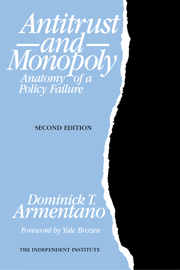
Yale Brozen (1918–1998) was a founding member of the Board of Advisors at the Independent Institute, Professor Emeritus of Business Economics at the University of Chicago Graduate School of Business, and author of the Foreword to the Independent Institute book, Antitrust and Monopoly: Anatomy of a Policy Failure, by D. T. Armentano.

A specialist in applied economics, microeconomics, industrial organization and technology, Professor Brozen received his Ph.D. in economics from the University of Chicago. He was a consultant for the U.S. Department of Justice's Antitrust Division, President's Materials Policy Commission, National Association of Manufacturers and the National Science Foundation; served on President Ronald Reagan's transition team; was Director of Research in the Transportation Center; was Director of the Annual Business Economists Conference of the Graduate School; taught at Northwestern University, Illinois Institute of Technology, University of Minnesota, and universities around the world; and was an Adjunct Scholar at the American Enterprise Institute for Public Policy Research.
His books and monographs include Concentration, Mergers, and Public Policy (with George Bittlingmayer); Advertising and Society; Is Government the Source of Monopoly? And Other Essays; The Competitive Economy: Selected Readings; Freight Transportation; Mergers in Perspective; Food Stamps and Nutrition (with Kenneth Clarkson); Automation: The Impact of Technological Change; Workbook for Economics; Regulation of Pharmaceutical Innovation: The 1962 Amendments (with Sam Peltzman); The American Drug Industry: Private Enterprise or Public Utility?; Can the Market Sustain an Ethic?; The Antitrust Task Force Deconcentration Recommendation; Corporate Responsibility: The Viability of Capitalism in an Era of Militant Demands (with William Mott, Leopold Tymand, Jeffrey St. john, Barbara Shenfield, and John Howard); Weight-distance Fees for Heavy Trucks: A Market Approach to Highway Pricing; The Cost of Bad Government: One Trillion Dollars; Industrial Concentration and Public Policy; The Voucher System; Competition, Efficiency, and Antitrust; The Minimum Wage Rate: Who Really Pays?; Textbook for Economics; Minimum Wage Rates and Household Workers; and Corporate Responsibility: The Viability of Capitalism in an Era of Militants Demands.








